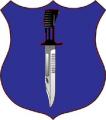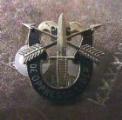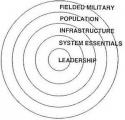War therefore is an act of violence to compel our opponent to fulfil our will.
Violence arms itself with the inventions of Art and Science in order to contend against violence. Self-imposed restrictions, almost imperceptible and hardly worth mentioning, termed usages of International Law, accompany it without essentially impairing its power [1]. Violence, that is to say physical force (for there is no moral force without the conception of states and law [2]), is therefore the
means; the compulsory submission of the enemy to our will is the ultimate
object. In order to attain this object fully, the enemy must be disarmed [3]; and this is, correctly speaking, the real aim of hostilities in theory. It takes the place of the final object, and puts it aside in a manner as something not properly belonging to war.
Der Krieg ist also ein Akt der Gewalt, um den Gegner zur Erfüllung unseres Willens zu zwingen.
Die Gewalt rüstet sich mit den Erfindungen der Künste und Wissenschaften aus, um der Gewalt zu begegnen. Unmerkliche, kaum nennenswerte Beschränkungen, die sie sich selbst setzt unter dem Namen völkerrechtlicher Sitte, begleiten sie, ohne ihre Kraft wesentlich zu schwächen [1]. Gewalt, d. h. die physische Gewalt (denn eine moralische gibt es außer dem Begriffe des Staates und Gesetzes nicht [2]), ist also
das Mittel, dem Feinde unseren Willen aufzudringen,
der Zweck. Um diesen Zweck sicher zu erreichen, müssen wir den Feind wehrlos machen [3], und dies ist dem Begriff nach das eigentliche Ziel der kriegerischen Handlung. Es vertritt den Zweck und verdrängt ihn gewissermaßen als etwas nicht zum Kriege selbst Gehöriges.



 Reply With Quote
Reply With Quote











 , and won't argue too much about the other two (Mosby & Jomini) other than to say they are examples of authors who provide insights upon
, and won't argue too much about the other two (Mosby & Jomini) other than to say they are examples of authors who provide insights upon 
Bookmarks